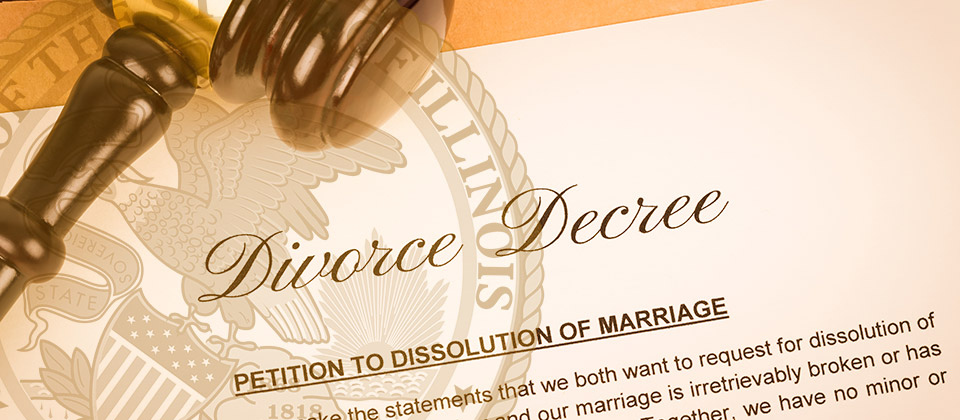Guide to Illinois Divorce Records

Many vital processes demand proof of your divorce, and Illinois divorce records are not the most accessible set of papers to track down at times. Obtaining divorce records isn't as simple as calling the closest court building, and instead, requires applicants to follow a structured process and payment options.
Applicants who fail to contact the right place or follow the correct procedure could be denied their records. A single unprocessed request can cost extensive amounts of time and set back other tasks like updating insurance or social security or amending a final judgment. These steps can help you avoid any unnecessary mistakes or delays.
What are Illinois Divorce Records?
Divorce records in Illinois are called "Dissolution of Marriage Records" and chronicle the entirety of a divorce process. They're composed of dozens of documents and carry information from the grounds for divorce to the final judgment.
In most cases, divorce records prove that a union has ended. However, this can be achieved with the divorce decree alone. The entire record is a source of context for a divorce and helps the courts understand why specific verdicts were made at the time.
The Illinois Vital Records Division only distributes divorce verification letters. Complete divorce records are only found through the court clerk's office that handled the divorce.

What's Inside the Divorce Record?
Divorce records are as complex or simple as the divorces they cover. The record will be extensive if a marriage has hundreds of assets, multiple children, and skilled lawyers. While the specifics vary between cases, the basic structure of divorce records is fairly consistent.
- Final Judgment: This decree signifies the resolution of all outstanding issues and serves as the conclusive ruling by the court. Any party dissatisfied with the decision has a 30-day window to file a Notice of Appeal.
- Affidavit: Family Courts mandate that both spouses provide a comprehensive rundown of their finances. Submissions focus on jointly and individually owned accounts, life insurance, tax returns, and outstanding debts. Some decrees include stipulations over future earnings and child education expenses.
- Spousal Support: Also called alimony or 'maintenance,' this covers one spouse's financial responsibility to the other. Illinois calculates alimony based on each party's income and expenses, but it may be adjusted at the judge's discretion. This state also practices lifetime or indefinite alimony, so it could last until one spouse dies or is remarried.
- Child Custody: These documents delve into meticulous specifics regarding child custody and support arrangements. Key elements typically include determining the primary caretaker and outlining the extent of visitation rights, providing a comprehensive framework for parental responsibilities.
- Division of Assets and Debt: Illinois is an equitable split state, meaning property is split equitably between the spouses.
Errors in Divorce Records
There are countless things to deal with during a divorce, and financial information is especially tricky. Assets can be outright forgotten or have their value wrongly estimated. Little mistakes like that can lead to incorrect judgments and spousal support payments that last for decades.
Illinois gives ex-spouses 30 days to file an appeal, starting from issuing the divorce decree. The appealing party must prove the mistake's existence and provide a valid reason why it happened. If the appellate judges deem there was a partial or complete error, the case is retried in lower courts.
If you suspect that an error is made, it's best not to leap into action. You have 30 days to appeal and should consider whether it's worth returning to court. You'd have to pay the associated legal fees, invest additional time, and put further stress on the family. Of course, you should appeal harmful errors, but not all errors have a noticeable effect on a decree's terms.
Additionally, in Illinois, you cannot appeal on facts you've already agreed upon. This prevents people from filing an appeal on a beneficial error to force a retrial.
Discussing Illinois' Low Divorce Rate

Illinois has the second lowest divorce rate in the country at 1.3 divorces per 1000 people. The success of marriages in this state is due to a happy combination of factors. A state's household income is the most trackable reason for low divorce rates.
Two-person households in Illinois average $81,190, considerably above the national average of $74,000. The most cited reason for divorce in the US is financial complications. Illinois's high income and relatively low cost of living dramatically soften one of the most significant contributors to divorce.
The second reason for Illinois' stellar divorce rates is a social shift. People are marrying later in life. This fact is true across the country, but most states haven't pushed the average marrying age of men past 30 years like Illinois has.
In Illinois, men first tie the knot at 30.2 years old, and women marry at 28.5.
How to Find Illinois Divorce Records
A divorce verification letter is often sufficient proof for many post-divorce chores. These are obtainable through the Illinois Department of Public Health through the Application for Verification of Dissolution of Marriage/Civil Union Record Files.
However, the state only maintains records for divorces from January 1, 1962. Contact the county courts or Illinois State Archives if you're filing for genealogical research.

You can visit the Vital Record Division Office in person or send the request form through the mail. Whichever you choose, you'll need to have the following:
- Names of the spouses during marriage
- County of divorce
- Date of divorce
- Unexpired government photo ID (Photocopy for mail)
Their offices charge $5 for the verification and another $5 for additional copies. Remember that if the provided information isn't correct, the request cannot be fulfilled, and payment will not be refunded.
Payments by mail must be made by check or money order payable to the Illinois Department of Public Health. Cash payment is NOT accepted and will result in an unprocessed request.
Requests should be mailed to:
Illinois Department of Public HealthDivision of Vital Records
925 E. Ridgely Ave.
Springfield, IL 62702-2737
Illinois Vital Records also accepts fax requests at (217) 523-2648. You'll fax the same form, a photocopy of your ID, and your credit card number and expiration date. Fax requests are more expensive and come with a $12.95 credit card handling charge and a $19.50 UPS charge.
Ordering from the Courts
The State Vital Records Department doesn't carry complete divorce records. So, if you need to reference specific documents or look through the terms of the final judgment, you must go through the county court directly.
Ensure you visit the county that finalized your divorce, as other counties will not have your information.
Each county has a slightly different request process and charges varying fees. However, all of them will accept walk-in and mail orders, and you still must provide the spouses' names during marriage and the date of divorce.
Some counties, like McLean County, offer online ordering platforms. They have a unique form you can fill out, and you'll need to input the divorce case number since it is a self-service process. We recommend checking your county's official website for more options.
Illinois Circuit Court Contact Directory
Tracking down the right person to help you is a challenge. Many people prefer to speak to a representative who can help them better understand the application process. Below are the circuit court phone numbers for the top ten most populous Illinois counties.
| County | Phone Number |
|---|---|
| Cook County | (312) 603-5030 |
| DuPage County | (630) 407-8700 |
| Lake County | (847) 377-3380 |
| Will County | (815) 730-7155 |
| Kane County | (630) 232-3413 |
| McHenry County | (815) 334-4190 |
| Winnebago County | (815) 319-4500 |
| Madison County | (618) 692-6240 |
| St. Clair County | (618) 277-6600 |
| Champaign County | (217) 384-3725 |
FAQ on Divorce Records in Illinois
What's the difference between a divorce record and a divorce verification?
Divorce verifications are typically a letter or page confirming a divorce record in the state's database. It doesn't include sensitive information on the spouses and is used as proof of divorce for many governmental tasks like name changes.
Divorce records offer a complete rundown of a divorce. It includes the divorce decree and all substantiating documents used by both legal teams. The entire record helps review the context of a divorce.
Do I need my divorce records to remarry in Illinois?
You cannot remarry in Illinois unless your previous marriage is legally terminated in court. You must provide proof of this with a certified divorce decree, although a divorce verification letter is often sufficient.
However, Illinois has no waiting period for remarriage once the final judgment is signed. This means you can immediately request your divorce record in person and get remarried the same day.
Do I have to pay a fee to get my divorce record in Illinois?
A certified divorce decree's cost will vary per county, but not by much. The general rate is $2 for the first page and an additional charge for each subsequent page. However, this extra charge rarely exceeds $1.
You can expect to pay around $10 on average for non-certified divorce records with a $5 certification fee.
Ordering through the Vital Records Division costs a $5 verification fee and another $5 for extra copies. If you're using fax, it'll be considerably more expensive.
Who can request my divorce decree in Illinois?
Certified divorce decrees are only given to those directly involved in the divorce or through a court order. Both the state office and county courts must confirm your identity. This is why you must send in a valid government photo ID alongside your application.
How long do I have to wait for divorce records?
Long wait times are frustrating when you have an urgent need. If you require immediate service, you must make the drive to the county courts or the Illinois Vital Records Office.
Mail requests have an estimated processing time of 4 to 6 weeks. This estimate does not include delivery times to and from the office, so your actual wait time is closer to 5 to 7 weeks. However, the processing times for counties will vary based on each office's workload and staffing. It's best to contact their offices directly for an estimate.
